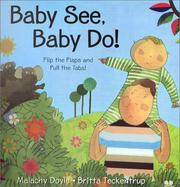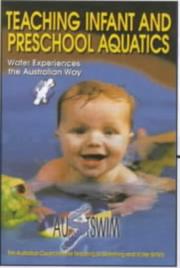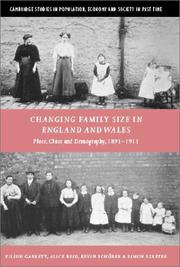| Listing 1 - 6 of 6 |
Sort by
|

ISBN: 0399237283 Year: 2001 Publisher: New York Putnam
Abstract | Keywords | Export | Availability | Bookmark
 Loading...
Loading...Choose an application
- Reference Manager
- EndNote
- RefWorks (Direct export to RefWorks)
An interactive reading experience where the reader flips the flaps over, or pulls the tabs to reveal how a human baby's behavior is similar to that of animal babies in the wild.
Toy and movable books --- Animals --- Babies --- Toy and movable books --- Infancy
Dissertation
ISBN: 9064646082 Year: 2001 Publisher: [S.l.] [s.n.]
Abstract | Keywords | Export | Availability | Bookmark
 Loading...
Loading...Choose an application
- Reference Manager
- EndNote
- RefWorks (Direct export to RefWorks)
Surrogate Mothers. --- Fertilization in Vitro. --- Fertilizations in Vitro --- In Vitro Fertilization --- Test-Tube Babies --- Test-Tube Fertilization --- Babies, Test-Tube --- Baby, Test-Tube --- Fertilization, Test-Tube --- Fertilizations, Test-Tube --- In Vitro Fertilizations --- Test Tube Babies --- Test Tube Fertilization --- Test-Tube Baby --- Test-Tube Fertilizations --- Ectogenesis --- Genetic Engineering --- Insemination, Artificial --- Host Mothers --- Gestational Carriers --- Gestational Mothers --- Mothers, Gestational --- Mothers, Surrogate --- Carrier, Gestational --- Carriers, Gestational --- Gestational Carrier --- Gestational Mother --- Host Mother --- Mother, Gestational --- Mother, Host --- Mother, Surrogate --- Mothers, Host --- Surrogate Mother --- Netherlands. --- Aruba --- Curacao --- Holland --- Kingdom of the Netherlands --- Sint Maarten --- Theses --- Surrogate Mothers --- Fertilization in Vitro

ISBN: 0736032509 Year: 2001 Publisher: Champaign Human kinetics
Abstract | Keywords | Export | Availability | Bookmark
 Loading...
Loading...Choose an application
- Reference Manager
- EndNote
- RefWorks (Direct export to RefWorks)
797.21 --- 021595.jpg --- Watergewenning --- Zwemmen: kleuters --- Zwemmen --- 797.21 Zwemmen --- Swimming for children --- Swimming for infants --- Swimming --- Aerobic exercises --- Aquatic sports --- Athletics --- Human locomotion --- Water babies --- Infants --- Sports for children --- Study and teaching --- Safety measures

ISBN: 0521801532 0511119356 0511153368 0511047606 0511327870 0511495811 1280154837 1107122716 0511032331 9780511032332 9780511119354 051101936X 9780511019364 9780511495816 9780511047602 9780521026673 0521026679 9781107122710 9781280154836 9780521801539 9780511327872 9780511153365 661015483X 9786610154838 0521026679 Year: 2001 Publisher: Cambridge Cambridge University Press
Abstract | Keywords | Export | Availability | Bookmark
 Loading...
Loading...Choose an application
- Reference Manager
- EndNote
- RefWorks (Direct export to RefWorks)
This volume is an important study in demographic history. It draws on the individual returns from the 1891, 1901 and 1911 censuses of England and Wales, to which Garrett, Reid, Schürer and Szreter were permitted access ahead of scheduled release dates. Using the responses of the inhabitants of thirteen communities to the special questions included in the 1911 'fertility' census, they consider the interactions between the social, economic and physical environments in which people lived and their family-building experience and behaviour. Techniques and approaches based in demography, history and geography enable the authors to re-examine the declines in infant mortality and marital fertility which occurred at the turn of the twentieth century. Comparisons are drawn within and between white-collar, agricultural and industrial communities, and the analyses, conducted at both local and national level, lead to conclusions which challenge both contemporary and current orthodoxies.
Family size --- Fertility, Human --- Infants --- Social classes --- History. --- Mortality --- England --- Wales --- Population. --- Family size. --- Fertility, Human. --- Fertility, Human - England - History. --- Infants. --- Social classes. --- Sociology & Social History --- Social Sciences --- Family & Marriage --- Mortality. --- Class distinction --- Classes, Social --- Rank --- Babies --- Infancy --- Human fertility --- Natality --- Size of families --- Cambria --- Cymric --- Gwalia --- Cymru --- Angleterre --- Anglii︠a︡ --- Inghilterra --- Engeland --- Inglaterra --- Anglija --- Caste --- Estates (Social orders) --- Social status --- Class consciousness --- Classism --- Social stratification --- Children --- Demography --- Human reproduction --- Infertility --- Family planning --- England and Wales --- Arts and Humanities --- History

ISBN: 0754613011 9780754613015 Year: 2001 Publisher: Aldershot Ashgate
Abstract | Keywords | Export | Availability | Bookmark
 Loading...
Loading...Choose an application
- Reference Manager
- EndNote
- RefWorks (Direct export to RefWorks)
The Euricon Project, "Is obtaining informed consent for neonatal research an "elaborate ritual"? - A European Study" was a three-year European Union BioMed-funded study which commenced in 1996. The project partnership comprised a multidisciplinary team of neonatologists, ethicists, lawyers and a sociologist specialising in European medical issues. This volume brings together the various findings of the Euricon study. In the first section of the book, the contributors provide an introduction to the study and outline the ethical issues that impinge on the process of informed consent for neonatal research. The practical problems, encountered by both neonatologists and parents in a specific multicentre, neonatal trial, are outlined. The second section offers an analysis of European Research Ethics Committees, and their role in the ethical review of medical research protocols. Section Three provides a comparative analysis of the law governing informed consent in neonatal research within Europe, and Section Four looks at the process of obtaining informed consent. The final section consists of the consensus statement on the conduct of the informed consent process of the Euricon research project. This statement is derived both from the empirical work and from reflection and discussion amongst the partnership at the three colloquia of the project. Finally, and importantly, issues which were widely discussed, but about which no consensus was reached, are outlined. This volume brings together the findings of a Euricon project which commenced in 1996 and explored whether obtaining informed consent for neonatal research in Europe is necessary. The project partnership comprised a team of neonatologists, ethicists, lawyers and a sociologist in medical issues.
Neonatology --- Infants --- Informed consent (Medical law) --- Medical ethics --- Research --- Moral and ethical aspects --- Neonatal pediatrics --- Biomedical ethics --- Clinical ethics --- Ethics, Medical --- Health care ethics --- Medical care --- Medicine --- Consent, Informed --- Consent to treatment --- Disclosure, Medical --- Medical disclosure --- Treatment, Consent to --- Babies --- Infancy --- Perinatology --- Newborn infants --- Bioethics --- Professional ethics --- Nursing ethics --- Social medicine --- Consent (Law) --- Medical personnel --- Patient education --- Involuntary treatment --- Patient refusal of treatment --- Children --- Malpractice --- Neonatology - Research - Moral and ethical aspects - Europe. --- Infants - Research - Moral and ethical aspects - Europe. --- Informed consent (Medical law) - Europe. --- Medical ethics - Europe.
Book
ISBN: 2738109284 9782738109286 Year: 2001 Publisher: Paris Odile Jacob
Abstract | Keywords | Export | Availability | Bookmark
 Loading...
Loading...Choose an application
- Reference Manager
- EndNote
- RefWorks (Direct export to RefWorks)
Chaque année, en France, des dizaines de milliers de bébés sont placés dès leur naissance en service de réanimation. Pour les parents, c'est un choc et une immense douleur : on les sépare de leur enfant qui vient à peine de naître. Pour l'équipe médicale, c'est une urgence, qui nécessite l'administration de soins souvent très lourds. Pour tous, c'est un combat autour d'un nouveau-né en difficulté. Que peut-on faire aujourd'hui pour améliorer la situation de tous ces enfants dont la vie commence à l'hôpital, loin de l'environnement familial habituel ? Comment limiter au maximum leur souffrance physique et psychique ? Comment mieux respecter leurs rythmes ? Comment répondre à tous leurs besoins ? Un ouvrage indispensable pour que parents et soignants puissent, ensemble, aider ces bébés à vivre, mais aussi à se développer dans les conditions les plus harmonieuses.
Neonatal intensive care --- CPR (First aid) for infants --- Child psychiatry --- Nouveau-nés --- Réanimation cardiorespiratoire chez le nourrisson --- Enfants --- Soins intensifs --- Psychiatrie --- Intensieve zorg --- Anesthesie en reanimatie --- Neonatalogie --- neonatale intensieve zorg --- Anesthésie et réanimation --- Néonatalogie --- soins néonataux intensifs --- Infants --- Newborn infants --- Premature infants --- Infant psychology --- Psychological aspects --- Death --- Hospital care --- Nouveau-nés --- Réanimation cardiorespiratoire chez le nourrisson --- Intensive care, Neonatal --- Intensive care of the newborn --- Newborn intensive care --- Infant health services --- Pediatric intensive care --- Neonatal emergencies --- Babies --- Infancy --- Children --- Birth, Premature --- Infants (Premature) --- Preemies --- Preterm infants --- Birth weight, Low --- Infants (Newborn) --- Neonates --- Newborns (Infants) --- Neonatology --- Child psychology --- Death&delete& --- Hospital care&delete& --- Psychology --- Development --- Child psychiatry. --- Neonatal intensive care - Psychological aspects --- Infants - Death - Psychological aspects --- Newborn infants - Hospital care - Psychological aspects --- Premature infants - Hospital care - Psychological aspects
| Listing 1 - 6 of 6 |
Sort by
|

 Search
Search Feedback
Feedback About UniCat
About UniCat  Help
Help News
News